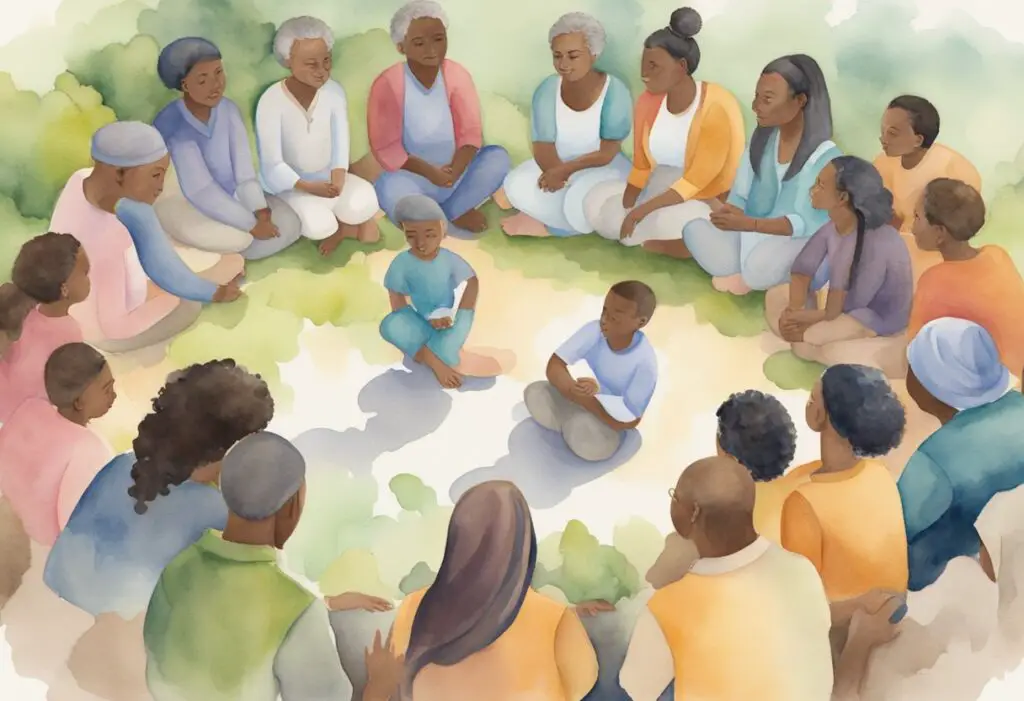Finding resilience through spirituality can be a powerful tool in overcoming life’s challenges. A healthy spiritual life can act as a major motivator, helping you navigate difficulties with greater ease and resilience. Whether it’s through prayer, meditation, or reflecting on your beliefs, spirituality provides an internal compass and a sense of meaning that can guide you through stressful times.

Studies have shown that spiritually resilient people often cope better with tough situations, experiencing a higher level of well-being and emotional intelligence as a result. Engaging in spiritual practices helps you tap into a reservoir of inner peace and strength, which is invaluable when faced with life’s inevitable storms.
If you’re seeking ways to enhance your mental health and overall life satisfaction, exploring spiritual resilience can be a transformative experience. By integrating spiritual practices into your daily routine, you can not only reduce stress but also cultivate a more profound sense of purpose and well-being. Dive into the journey of spiritual resilience and discover how it can help you build a stronger, more resilient self.
Understanding Spirituality and Resilience
-

Celestial Soul Eco-Friendly Tote Bag
$18.50 Select options This product has multiple variants. The options may be chosen on the product page -

Celestial Soul Women’s T-Shirt
$20.00 – $21.50 Select options This product has multiple variants. The options may be chosen on the product page
Spirituality and resilience are intertwined in ways that can provide you with deeper meaning, purpose, and well-being. By exploring their essence and interconnection, you can find strengths that help you overcome life’s challenges.
The Essence of Spirituality
Spirituality connects you with something greater than yourself, providing a sense of meaning and purpose. It may involve beliefs, practices, and experiences that nurture your inner life and relationships.
Engaging in activities such as meditation or prayer can foster spiritual growth. These practices can enhance your emotional well-being and help you maintain a positive outlook even when facing adversity. Spirituality often brings you into closer connection with your own values and the world around you.
Defining Resilience in Life’s Context
Resilience is your ability to adapt and thrive despite facing challenges, setbacks, or traumatic events. It is not just about bouncing back but also about growing stronger through experiences.
Many factors contribute to resilience, including emotional intelligence, social support, and coping skills. Resilience can be cultivated over time through life experiences and conscious efforts to build strengths and capabilities.
Interconnection of Spirituality and Resilience
Spirituality plays a significant role in enhancing resilience by providing you with a framework that supports positive emotions and coping strategies. Spiritual beliefs and practices can help you navigate life’s hardships.
Studies, such as those mentioned by Trejo et al., show that spiritually resilient individuals tend to have better wellness and life satisfaction. The power of belief, commitment to spiritual values, and spiritual transformation are key domains where spirituality and resilience intersect.
By integrating spiritual resilience, you can maintain a sturdy spirit and clear sense of purpose even in difficult times. This combination strengthens your ability to adapt and persevere, promoting overall well-being and life satisfaction.
Spiritual Practices That Foster Resilience
Engaging in spiritual practices can significantly aid you in building resilience by fostering inner strength, clarity, and a sense of peace. These practices offer structured ways to navigate life’s challenges, providing effective coping strategies that are both calming and empowering.
Meditation and Mindfulness
Meditation and mindfulness involve focusing your mind on the present, helping you to cultivate a sense of peace and gratitude. When you meditate, you’re invited to observe your thoughts without judgment, making it easier to manage stress and maintain spiritual resilience.
By practicing mindfulness, you can better cope with adversity. Techniques such as mindful breathing or body scans can enhance your emotional resilience, grounding you in the present moment and allowing you to respond thoughtfully rather than react impulsively. Regular meditation sessions can transform the way you handle life’s inevitable difficulties.
Prayer and Contemplation
Prayer and contemplation provide a sacred space for you to connect with something larger than yourself. This practice can be a daily ritual or an occasional activity, depending on your personal beliefs and needs. Through prayer, you can express gratitude, seek guidance, and find solace.
Contemplation often involves quietly reflecting on spiritual texts or life’s deeper meanings. It offers an opportunity to gain insights and develop a resilient mindset. Prayer and contemplation can anchor you during turbulent times, serving as a coping mechanism that enhances your spiritual resilience and provides emotional support.
Rituals and Sacred Observances
Rituals and sacred observances help you to reaffirm your beliefs and remain spiritually grounded. These practices can vary widely, from attending religious services to performing personal rituals in your home. Participating in these observances creates a sense of community and belonging, which is crucial for resilience.
Rituals often include acts of gratitude and spiritual coping strategies that reinforce your connection to your faith tradition. They can provide structure and meaning during challenging periods, enabling you to feel supported and less alone. Engaging in sacred observances helps to maintain your focus and fortitude, reinforcing your ability to navigate life’s struggles with grace.
Dealing with Life’s Challenges
Spirituality offers a supportive foundation to manage and overcome life’s challenges by fostering resilience and emotional well-being. It’s particularly beneficial during periods of illness, trauma, and aging, guiding you towards spiritual growth and recovery.
Overcoming Adversity and Stress
Life’s challenges and adversity often bring significant stress. Spirituality can act as a buffer against this stress, encouraging a positive perspective. Practices such as meditation and prayer can reduce stress levels, promoting emotional resiliency.
You may also find clarity and guidance through spiritual teachings, helping you navigate difficulties without feeling overwhelmed. By viewing challenges as opportunities for spiritual growth, you develop a stronger coping mechanism.
Spirituality in Times of Illness and Trauma
Illness and trauma can be profoundly distressing, but spirituality can provide a sense of comfort and hope. Many people turn to their spiritual beliefs and practices for solace and strength during such times. Engaging in spiritual care activities, such as attending religious services or community groups, can foster a sense of belonging and support.
Moreover, spirituality can facilitate recovery by encouraging a positive outlook and fostering a supportive community. This spiritual connection often leads to improved emotional well-being, aiding in the healing process.
Aging Gracefully with Spiritual Strength
Aging brings its own set of challenges, but spiritual strength can help you face these with grace and resilience. Spirituality often becomes more significant as you age, offering a sense of purpose and a deeper understanding of life’s transient nature.
You might find joy in daily spiritual practices that reinforce your emotional and spiritual health. By embracing aging as a spiritual journey, you can foster a positive perspective, maintain emotional balance, and build resilience against the adversities associated with growing older.
The Role of Relationships and Community

Positive relationships and strong community ties play a significant role in fostering resilience, especially when grounded in spirituality. These relationships can provide you with essential social support and a sense of belonging, enriching your spiritual life.
Building Social Support through Spirituality
Spirituality often fosters close-knit relationships that become a crucial support system during challenging times.
Involvement in spiritual or religious practices can help you develop meaningful connections with others who share your values and beliefs. These connections can provide emotional and spiritual support, which is particularly beneficial when you face adversity.
Active participation in community activities such as group prayers, meditation sessions, or spiritual study groups can deepen your relationships and create a network of people who truly understand and support you.
Having a strong social support system rooted in shared spiritual values can offer comfort, guidance, and encouragement, aiding you in navigating life’s challenges more effectively.
Impact of Spiritual Communities on Resilience
Faith communities can significantly influence your ability to remain resilient in the face of difficulties.
These communities offer a sense of belonging and purpose, helping you feel connected to a larger whole. This connectedness can be a powerful motivator, encouraging you to push through tough times.
Engaging with a spiritual community can provide you with various forms of support, such as emotional, psychological, and even material assistance. Being part of a faith community often means that you have access to a network of individuals who are willing to help in times of need.
Spiritual communities also offer structured opportunities for service and compassion, allowing you to focus on helping others, which can further enhance your own resilience by shifting your focus away from personal struggles.
Personal Growth and Spiritual Transformation

Exploring spirituality often leads to profound personal growth, helping you navigate through life’s challenges while promoting joy and happiness. It emphasizes the process of resilience, coping mechanisms, and self-compassion.
Finding Joy and Happiness
Embracing spirituality can lead to finding more joy and happiness in life. When you connect with a higher purpose or power, it often brings positive emotions and a sense of fulfillment.
Meditation, prayer, and other spiritual practices can open you to moments of joy, even amid hardship. This joy isn’t just fleeting happiness but a deeper, more sustained feeling of contentment and peace.
Spiritual communities also play a role. Being part of a group with shared beliefs can provide a support network, boosting your sense of belonging and joy. This collective upliftment is a pivotal aspect of spiritual transformation.
Spiritual Growth through Hardships
Hardships can be catalysts for spiritual growth. When life presents challenges, your spiritual practices and beliefs often become essential coping tools.
These hardships promote resilience and self-compassion. Reflecting on your struggles through a spiritual lens can lead to significant personal growth.
You learn to see these challenges as spiritual experiences contributing to your transformation. This perspective helps you endure and eventually transcend difficulties, fostering inner strength and wisdom.
Transcending Challenges with Spiritual Insights
Spiritual insights provide tools to transcend challenges. By engaging in spiritual practices, you gain a unique understanding and acceptance of life’s ups and downs.
These insights teach you that every challenge has a purpose and is part of your spiritual journey. They help you perceive setbacks as opportunities for growth.
Spiritual texts, mentors, or personal revelations can guide you through difficulties. They offer lessons and principles that reshape how you approach life’s obstacles, making the process of resilience more intuitive and impactful.

